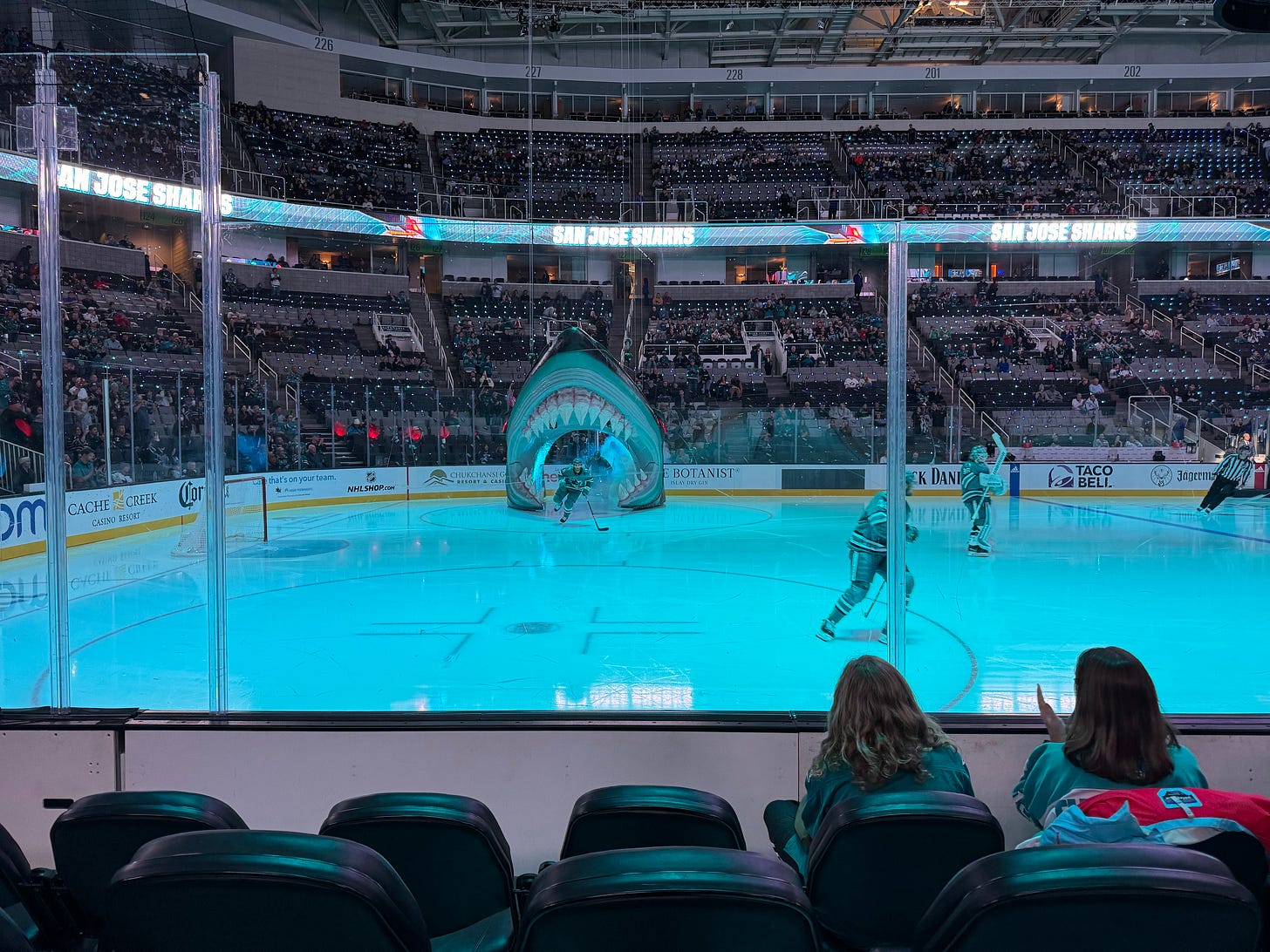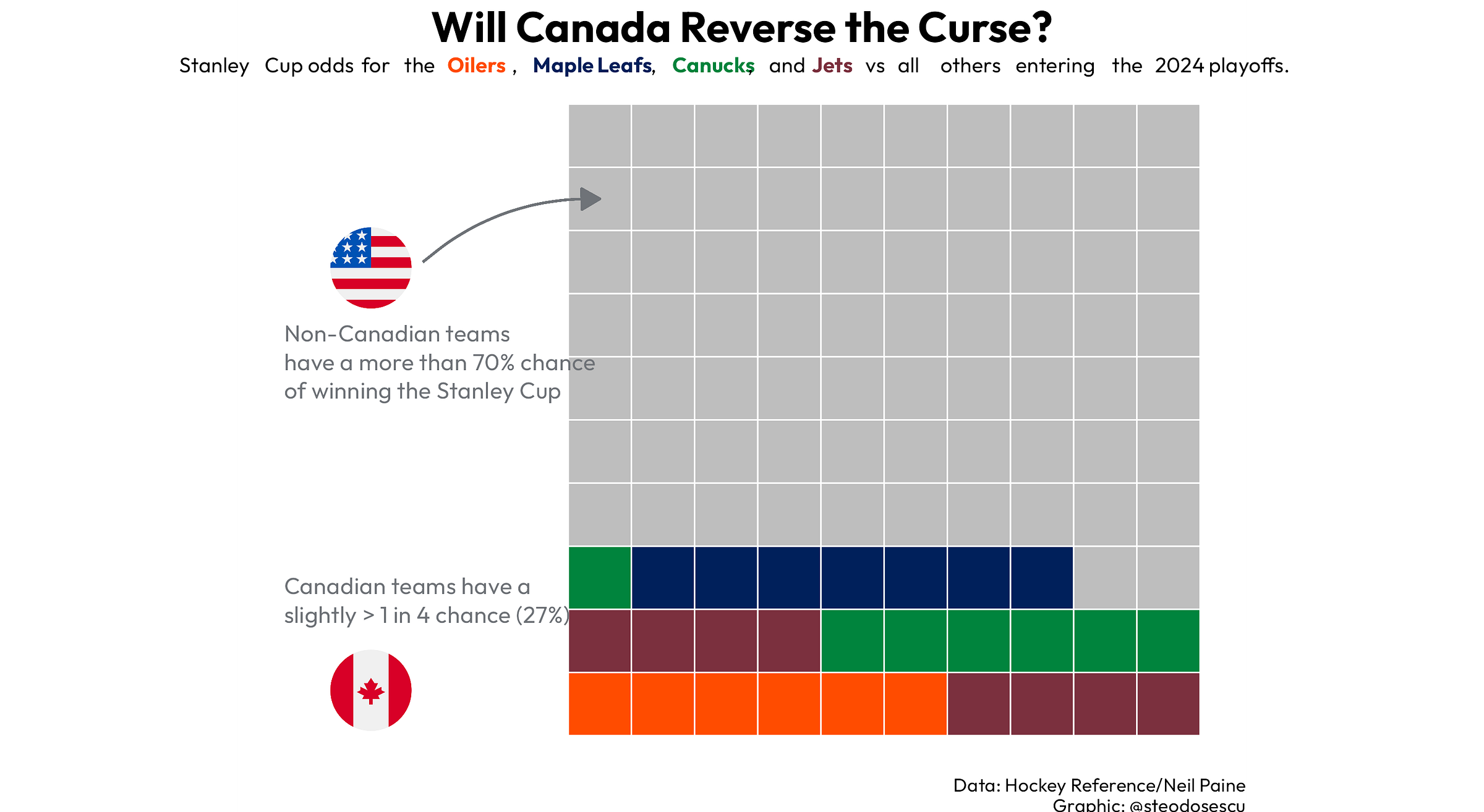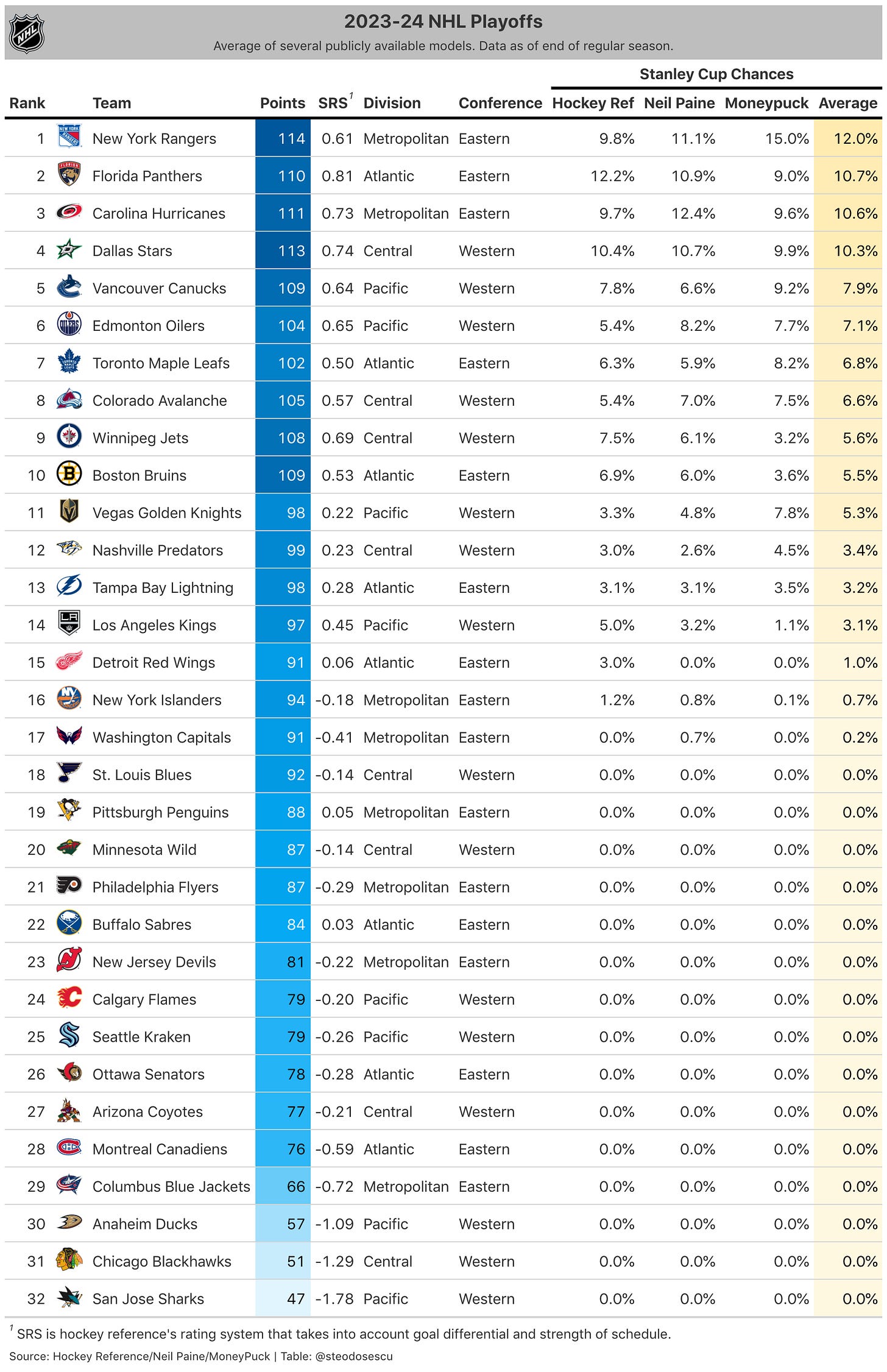Will a Canadian team finally win the Stanley Cup 30 years after Montreal's triumph?
Four teams have a combined 27% chance to end Canada's championship drought since 1993-94
The NHL playoffs are here and that means it’s time for our favorite parlor game: predict whether a Canadian team will break the curse to win the Stanley Cup or not this year.
Their fans have certainly been waiting a long time. Like I wrote last year:
In any given year there's roughly a 22 percent chance (7/32) a team from north of the border wins the title, so we would expect to see a Canadian championship one out of every four to five years. By now we should have seen at least four combined championships given these odds. In fact, if a champion were randomly chosen from all NHL teams active each season, the odds that a Canadian team would have won at least one Stanley Cup since 1993-94 are more than 99.9 percent — but that of course hasn't happened.
In other words, this means that for every 3,100 or so times this scenario is played out in a parallel universe, we would expect no Canadian team to win — as has been the case in this reality — only about once1. So the fact we haven’t seen one is bonkers.
Nate Silver wrote a great piece in 2013 about how unlikely a run of such futility among Canadian clubs really is, if you weren’t already convinced. The funny thing is it’s been more than a decade since it came out and a Canadian team still hasn’t won.
Of course not every team has an equal chance of winning the Cup at the outset of the season, or now, the playoffs. Last year I wrote Canadian teams had just a one in seven chance headed into the playoffs2, so their chances have certainly improved since then. Canadian teams’ odds are also slightly better than if we just randomly picked a winner from the field of 16 teams (25 percent). So you would think Canadian fans must feel pretty good about this year’s playoffs entering Saturday.
Why one of the Canadian teams might win this year:
Edmonton Oilers: They have the best player in the world in Connor McDavid. And they won 16 games in a row at one point this season, so Edmonton has the ingredients to get hot for a long stretch of time needed in the playoffs.
Toronto Maple Leafs: They have Auston Matthews, who scored an insane 69 goals this regular season.
Winnipeg Jets: They’re one of the most improved defensive teams since last year, and sported the best goals against average in the league this season.
Vancouver Canucks: Puck luck. If their league-leading PDO3 keeps up, they might just luck their way into Canada’s first Cup since the 1990s.
Why a Canadian team might not win:
No matter what narrative you spin up, the odds say it’s still more likely than not a team south of the border will win it all this season.
Stanley Cup Probabilities
This year’s playoffs look wide open, with eight different teams owning at least a 6.25 percent chance of winning the Cup — the same odds if you randomly picked one of the 16 teams involved — and none more than 12 percent, when averaging an ensemble of publicly available playoff models4. The highest odds belong to the New York Rangers, while the Florida Panthers have an 10.7 percent chance, the Carolina Hurricanes 10.6 percent and Dallas Stars sport 10.3 percent odds. Everybody else is in the single digits.
As Neil Paine pointed out in his newsletter this week, your best shot at figuring out who will win is identifying which underperforming goaltender will get hot. It’s a common adage that the only thing that matters in the NHL postseason is streaky netminding, so with many top NHL goalies having seemingly down years it feels like parity will be on full display this postseason.
Here is a final look at the chances for all teams participating in this year’s playoffs, according to the models:
Sharks Futility
One team that won’t be in this year’s playoffs is the San Jose Sharks; they looked to be out of the race after the first couple weeks of the season.
The Sharks finished with the lowest point total of any team (47) and didn’t even reach the 20-win mark this year. They had the worst goal differential of any NHL team since the 1993-94 Ottawa Senators and the second worst in franchise history — they owned a minus-196 goal difference in their 11-win season in 1992-93, their second year as a club.
Not surprisingly they finished dead last in Neil Paine’s NHL Elo Ratings this season too.

A perennial playoff contender throughout the aughts, the Sharks haven’t been league average in Paine’s Elo ratings since late 2019, and this year they dipped to levels seen only in the early expansion days of the early 1990s. Back then expansion teams didn’t get the advantages newcomers in the modern NHL do today (see the Vegas Golden Knights’ success).
The 1974-75 Washington Capitals are considered the worst team of all time, and while San Jose won more games then those Caps and had a much healthier goal differential this season, the Sharks were often in the conversation of among the worst teams to ever take the ice in the modern NHL.
Back in November they suffered their worst loss of the season, a 10-1 shellacking at home against the Vancouver Canucks. In their very next game the Pittsburgh Penguins came into the Shark Tank and followed that up with a 10-2 drubbing — a 20-3 goal differential in two home games for San Jose.
By the end of the Canucks game the few Sharks fans that stayed for all three periods at SAP Center were heard cheering ‘We just want one!’ as their team was staring down the barrel of a double-digit shutout.
Naturally the Sharks averaged the second smallest per-game crowd in the league this season behind the Winnipeg Jets5. SAP Center, once considered one of the most intimidating buildings in the NHL, is a shell of its former self. It’s one of the smaller buildings in the league but always produced a cacophony of noise in the good times because of its intimate atmosphere. But this year a half empty arena was the norm on any given night. In fact the Sharks hosted 13 games this season with an announced attendance of under 11,000.
If any good news can come out of this season, it may be specifically for Canadian fans: The last time the San Jose Sharks were this bad the Montreal Canadiens won the Stanley Cup. Can a team from the Great White North do it again in 2024?
Let’s walk through the math. assuming every team has an equal chance at the beginning of the season, there is a certain chance a Canadian team wins the Stanley Cup depending on the proportion of Canadian teams making up the NHL landscape in any given year. Multiplying each of these probabilities since the 1993-94 season gives us 1-(8/26) * 1-(8/26) * 1-(7/26) * 1-(7/26) … * 1-(7/32) = 0.0598%.
This was based off FiveThirtyEight.com’s model (RIP) at the time.
PDO doesn’t stand for anything. It’s just the sum of a team's shooting percentage and its save percentage, and is considered a proxy for how lucky a team has been. It’s used to identify teams that are candidates for regression. According to Wikipedia, the term PDO comes from the online handle of Brian King, the first to propose it.
Because Winnipeg’s arena is smaller than SAP Center the Jets had the lowest average attendance, but San Jose had the lowest attendance as a percentage of capacity this year (77.8% percent).







